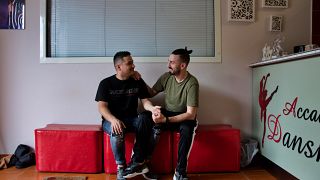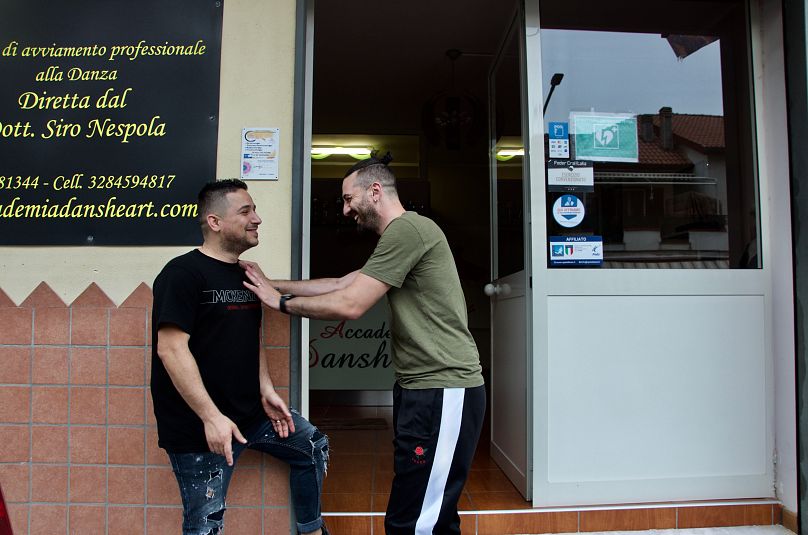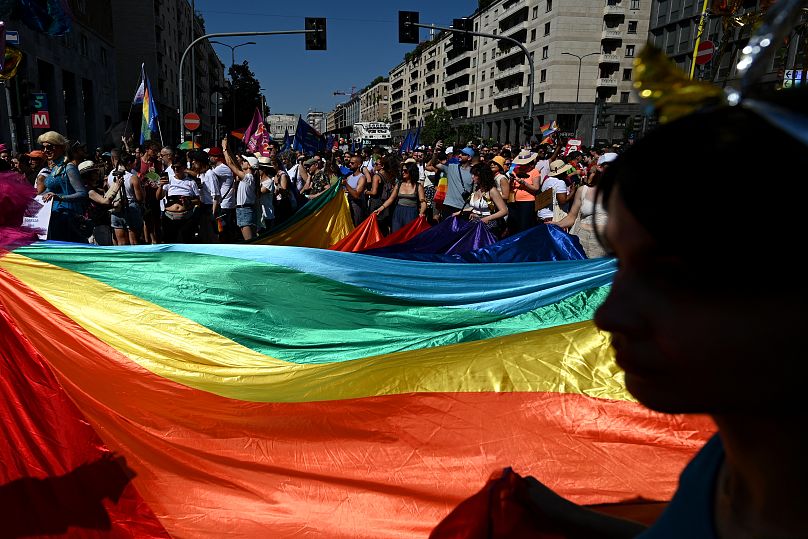
By Savin Mattozzi • Updated: 30/06/2023 -
In Italy, same-sex couples don't have a legal right to adoption or surrogacy. Now the right-wing government wants to close a loophole allowing them to adopt abroad.
Siro and Giuseppe first met in the early days of online dating in 2006. After exchanging phone numbers, they spoke over the phone for six months before deciding to meet in person.
“I don’t know what struck me most about him” Siro explains. “At first I was infatuated by his person, aside from just his physical appearance. Obviously I liked his eyes and how he is physically. But I fell in love with what was inside him.”
They eventually moved in together as they continued to build a life of their own. Siro, 38 and Giuseppe 36, manage a dance school outside of Naples in addition to working their regular jobs.
Slovenia becomes first post-communist country to legalise same-sex marriage and adoption
Then, as happens in the lives of many couples, the two started to discuss the possibility of having children.
“It might have been after a movie but one night we started talking about this idea to have a child” Giuseppe says. “And I asked ‘who knows if we could even have a kid.”
Nearly seven years after they first asked themselves that question, they now know how complicated the situation really is.
Rights and responsibilities

Siro and Giuseppe photographed laughing together.
Savin Mattozzi/Euronews
In Italy, same-sex couples do not have a legal right to adoption, stepchild adoption or surrogacy. The only opportunity for both parents to have rights with their child is via a legal loophole where the parents can go to another country and have their child by surrogacy.
Now, Italy’s right-wing government is looking to close that opportunity as well, making the possibility for same-sex couples to have children nearly impossible.
Italy has historically lagged far behind its Western European neighbors in its treatment of LGBTQ people. According to ILGA-Europe, Italy ranked 34th out of 49 European countries in terms of rights granted to the LGBTQ community.
Even if the law is not passed, LGBTQ families and people in Italy still struggle to be treated equally under the law.
The country has been condemned by the EU parliament, Human Rights Watch and the European Court of Human Rights over the years for its treatment of LGBTQ people without any affirmative action taken by the state.
For Giuseppe, this leaves him feeling a sense of abandonment from the European community.
“Considering that we are a European country and that they have an obligation to defend us, they [European countries] only use their power to say things” Giuseppe says. “Defend us, actually defend us, not just with words but with concrete actions.”
In Italy, same-sex couples do not have a legal right to adoption, stepchild adoption or surrogacy. The only opportunity for both parents to have rights with their child is via a legal loophole where the parents can go to another country and have their child by surrogacy.
Now, Italy’s right-wing government is looking to close that opportunity as well, making the possibility for same-sex couples to have children nearly impossible.
Italy has historically lagged far behind its Western European neighbors in its treatment of LGBTQ people. According to ILGA-Europe, Italy ranked 34th out of 49 European countries in terms of rights granted to the LGBTQ community.
Even if the law is not passed, LGBTQ families and people in Italy still struggle to be treated equally under the law.
The country has been condemned by the EU parliament, Human Rights Watch and the European Court of Human Rights over the years for its treatment of LGBTQ people without any affirmative action taken by the state.
For Giuseppe, this leaves him feeling a sense of abandonment from the European community.
“Considering that we are a European country and that they have an obligation to defend us, they [European countries] only use their power to say things” Giuseppe says. “Defend us, actually defend us, not just with words but with concrete actions.”
Setbacks in legislative progress

Participants hold a giant rainbow flag as they take part in the Pride March to show support for members of the LGBT community, in Milan on June 24, 2023.
GABRIEL BOUYS/AFP
Recently, Italian politicians tried to make concrete change to laws that would protect the LGBTQ community.
In 2021, a group of politicians attempted to pass a law that would make it a hate crime to attack someone based on their sexual orientation, gender identity or disability. The law was swiftly kicked out of parliament after a vote which ended in the right-wing coalition cheering its failure.
“Since the passing of civil unions in 2016, we basically haven’t progressed” Explains Benny, a 38-year-old university worker who lives with her fiancé, Bianca. “Honestly at this point it looks like we’re going backwards… aside from civil unions, there are no rights for non-heterosexual people. Italy is truly among some of the most backward countries in Europe.”
The situation in Italy for not just LGBTQ individuals but also couples has forced people like Benny and Bianca to face some tough decisions about their future and whether they should stay or leave the country to have a better life.
“I, differently from Benny, would consider leaving Italy to bring up a child in a country that recognizes that they are the child of two people who love each other” says Bianca. “Apart from the fact that this proposed law is extremely discriminatory, it also is an injustice because just because a couple has the fortune to be a man and a woman doesn’t necessarily mean they are adept to be parents.”
Couples who decide to stay however risk having their parental rights being taken away from them even if they thought they were safe.
Recently, Italian politicians tried to make concrete change to laws that would protect the LGBTQ community.
In 2021, a group of politicians attempted to pass a law that would make it a hate crime to attack someone based on their sexual orientation, gender identity or disability. The law was swiftly kicked out of parliament after a vote which ended in the right-wing coalition cheering its failure.
“Since the passing of civil unions in 2016, we basically haven’t progressed” Explains Benny, a 38-year-old university worker who lives with her fiancé, Bianca. “Honestly at this point it looks like we’re going backwards… aside from civil unions, there are no rights for non-heterosexual people. Italy is truly among some of the most backward countries in Europe.”
The situation in Italy for not just LGBTQ individuals but also couples has forced people like Benny and Bianca to face some tough decisions about their future and whether they should stay or leave the country to have a better life.
“I, differently from Benny, would consider leaving Italy to bring up a child in a country that recognizes that they are the child of two people who love each other” says Bianca. “Apart from the fact that this proposed law is extremely discriminatory, it also is an injustice because just because a couple has the fortune to be a man and a woman doesn’t necessarily mean they are adept to be parents.”
Couples who decide to stay however risk having their parental rights being taken away from them even if they thought they were safe.


No comments:
Post a Comment